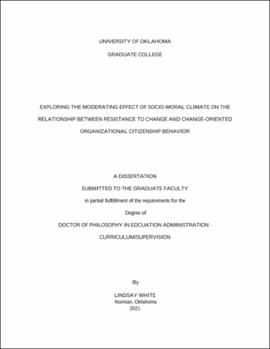| dc.contributor.advisor | Steinheider, Brigitte | |
| dc.contributor.advisor | Adams, Curt | |
| dc.contributor.author | White, Lindsay | |
| dc.date.accessioned | 2021-05-24T16:00:25Z | |
| dc.date.available | 2021-05-24T16:00:25Z | |
| dc.date.issued | 2021-05 | |
| dc.identifier.uri | https://hdl.handle.net/11244/329739 | |
| dc.description.abstract | To be able to compete and achieve goals, organizations must change at a rapid pace; ergo, they must create environments in which employees do not just accept change, but drive change that propels the organization forward. This study investigated the impact of dispositional and psychological climate variables on change-related outcomes in a higher education institution. Specifically, the study examined whether dispositional resistance to change was negatively related to change-oriented organizational citizenship behaviors (COOCB), and whether this relationship was moderated by socio-moral climate (SMC) perceptions. Full-time employees from a large multi-campus urban community college were surveyed by email with standardized questionnaires, yielding a 24.78% response rate for a total 227 responses. Multiple regression analyses tested the relationship between dispositional resistance to change and COOCB to examine whether those with higher dispositional resistance to change demonstrated less COOCB. Multiple regression analysis also tested the interaction effect between resistance to change and the moderator variable SMC on the criterion variable COOCB, to investigate if employees with more resistance to change were more likely to exhibit COOCB when perceiving a positive SMC. While dispositional resistance to change had a weak negative relationship with COOCB, SMC did not demonstrate a relationship with COOCB, either directly or as a moderator, when the study was conducted, during the height of the global COVID-19 pandemic. Results suggest limitations regarding the influence of dispositional resistance to change across contexts and suggest that ethical climate perceptions, although important for other outcomes, may not have a substantial relationship with change-related behavior. | en_US |
| dc.language | en_US | en_US |
| dc.subject | Resistance to Change | en_US |
| dc.subject | Change Management | en_US |
| dc.subject | Socio-Moral Climate | en_US |
| dc.subject | Higher Education | en_US |
| dc.subject | Change-Oriented Organizational Citizenship Behavior | en_US |
| dc.subject | proactive behavior | en_US |
| dc.subject | ethical climate | en_US |
| dc.title | Exploring the moderating effect of socio-moral climate on the relationship between resistance to change and change-oriented organizational citizenship behavior | en_US |
| dc.contributor.committeeMember | Ford, Timothy | |
| dc.contributor.committeeMember | Jennifer, Kisamore | |
| dc.contributor.committeeMember | Edwards, Beverly | |
| dc.date.manuscript | 2021-05 | |
| dc.thesis.degree | Ph.D. | en_US |
| ou.group | Jeannine Rainbolt College of Education::Department of Educational Leadership and Policy Studies | en_US |
| shareok.orcid | https://orcid.org/0000-0002-2760-5881 | en_US |
